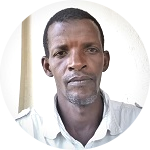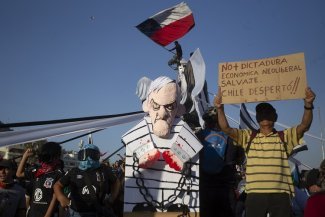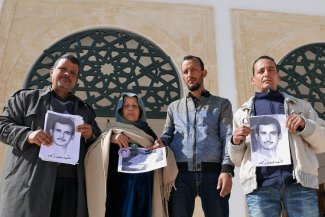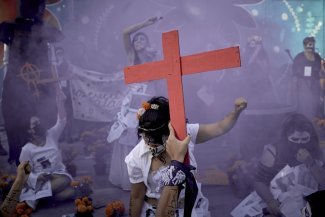A protest by members of the Coalition for Justice and Democracy in Guinea on 28 September 2016, in front of the United Nations in New York, on the seventh anniversary of the Conakry stadium massacre that took place on 28 September 2009.
Assmaou Diallo receives visitors at the headquarters of Avipa (Association of Victims, Relatives and Friends of 28 September 2009) in the suburbs of Conakry, the capital of Guinea. Sitting in front of her computer, she is on the phone with one of the victims, a member of the association, who would like to know how the legal case is progressing. The president of Avipa receives dozens of calls like this every week. Founded in 2009, the association’s aim is to provide victims with support and assistance in establishing the truth.
The walls in the association’s premises are covered with photos illustrating the tragedy endured by thousands of Guineans on 28 September 2009 in the Stade du 28 Septembre (28 September Stadium), in reference to the date of the beginning of the country’s independence process in 1958. On that day, shortly before noon, thousands of Guineans demonstrated against the candidacy of the head of the military junta, Captain Moussa Dadis Camara, in the 2010 presidential election. Carrying placards and singing Liberté, the national anthem, the demonstrators paraded to the applause of the main opposition leaders seated in the gallery. Suddenly, hundreds of soldiers, mostly the dreaded Presidential Guard, or Red Berets, burst into the stadium firing shots.
“At first we thought it was warning shots meant to disperse us,” recalls Aissatou Diallo, a survivor. “Then we saw people falling like flies. People started to run for their lives. But the assailants had closed and electrified the stadium doors to prevent us from escaping.”
The Red Berets fired until they ran out of bullets, then they proceeded to “knife people with their bayonets”, according to a Human Rights Watch (HRW) report on the incident. The death toll was very high. According to the United Nations, 157 people were killed, more than a thousand others were wounded, and hundreds of women were raped, in some instances with rifles. According to many witnesses, however, the number of victims is even higher. “The security forces then engaged in an organised cover-up to hide the extent of the killings by sealing off and removing bodies from the stadium and morgues and burying them in mass graves, many of which have yet to be identified,” writes HRW. Further abuses were committed against opposition supporters in the days that followed.
Will a trial ever be held?
The repression of the opposition rally was immediately and forcefully condemned by the international community, which increased the pressure on the junta. Calls were made for the massacre to be recognised as a “crime against humanity” under international law.
As early as October 2009, the International Criminal Court opened a preliminary examination into the situation in Guinea. Under pressure, Captain Moussa Dadis Camara blamed his aide, Lieutenant Toumba Diakité. Diakité, who did not want to take sole responsibility for the massacre, took advantage of an altercation with the leader of the junta to shoot him, leaving him with a serious head wound and removing him from power for good.
In 2010, Alpha Condé was finally elected to lead the country. The election of this historic opposition figure raised great hopes among the victims, to whom he promised that justice would be done. In February 2010, an investigation was opened into the events. It lasted seven years. Thirteen alleged perpetrators and instigators of the massacre were charged in the process. Among them were Captain Dadis Camara, who has been living in exile in Burkina Faso for several years, and his former aide, Lieutenant Toumba Diakité, who had fled to neighbouring Senegal, from where he was extradited in 2017. Unfortunately, the date of the trial has not yet been set, despite repeated requests from the victims and associations.
On 5 September 2021, for the third time in its history, Guinea suffered a military coup, led by the Red Berets. Eighty-three-year-old President Alpha Condé was overthrown by the army, raising fears of renewed massacres. The victims and their relatives, who were preparing to commemorate the 12th anniversary of the massacre, fear that the killers will never be brought to justice. Six human rights associations issued a statement calling for a “strong signal” from the transitional authorities that they “are willing to put respect for human rights and the fight against impunity at the centre of their priorities”.
Will the transition bring justice?
In his first speech, the country’s new strongman, Colonel Mamady Doumbouya, cited the “politicisation of justice” among the reasons for the military takeover. “Justice will be the compass that will guide every Guinean citizen,” promised the former French Foreign Legion officer.
For many observers, the reason the trial has not yet gone ahead is the judiciary’s manipulation by the executive branch of government. Captain Dadis, who has an important electoral stronghold in Guinée Forestière, his home region, reportedly gives voting instructions to the party in power at every election. “It is a deal made between Dadis and President Alpha Condé. As long as he gives voting instructions, he and his friends will not be troubled,” says a relative of the victim.
The opposition has recorded more than 100 deaths by gunshot during demonstrations during President Condé’s presidency. While the judiciary has always remained silent on these killings, it has, by contrast, condemned several people who were arrested during opposition marches.
After eleven years in exile, Captain Dadis Camara was allowed to return to the country on 22 December 2021. But those who had hoped that his return would pave the way for the organisation of a trial were soon disappointed. The former junta leader’s stay only lasted a few days. He quietly returned to Burkina Faso, after being issued with a diplomatic passport from the new head of the junta.
This move by the transitional president in favour of the main culprit in the 28 September massacre case is not likely to reassure the victims and their relatives.
“It is a way of encouraging impunity,” laments a citizen who lost a friend in the stadium. “It is as if the junta wanted to control the justice system too,” he continues. To support his argument, he cites the recent sacking of the minister of justice and human rights, Fatoumata Yarie Soumah. The minister was dismissed from her post on 31 December, barely two months after the transitional government was formed. “The transition risks taking a worrying turn. There’s been a change of hands, but the practices are the same,” says political analyst Aly Souleymane Camara.
Although the National Transitional Council (CNT) in charge of drafting a new constitution was recently set up on 5 February, the lawyers of the 28 September victims do not intend to give up. “If Guinean justice fails, we will turn to the international justice system,” warned Amadou DS Bah, lawyer and vice president of the Guinean Organisation for the Defence of Human Rights, once again. An international delegation went to Guinea in November to discuss the situation with the Guinean authorities. If things do not progress, the ICC prosecutor, Karim Kahn, could make this one of his next priorities.













